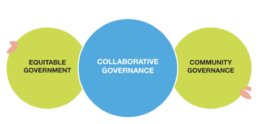Climate Justice Through Collaborative Design
Year Complete: 2022
Grant Amount: $75,000
Local Government: Multnomah County, OR
Local Foundation: Meyer Memorial Trust
Project Purpose
To establish a “third space” for frontline communities and local governments to come together as equals to co-create intersectional solutions that advance climate justice.
Key Lessons Learned
Lessons learned about tools and tactics through the project that other sustainability directors could use to advance their work.
Two key lessons learned from the project: 1) The importance of role clarity in collaborative projects. By design the project team deferred whenever possible to the leadership of the community participants. Absent clarity about roles and a decision making structure, the project experienced more hesitancy than was necessary or productive. 2) The importance of flexibility, namely adapting the process to meet community and local government capacity and meeting them where they are.
Lessons for developing a collaborative process between a local government sustainability director and local place-based foundation(s).
Projects should work to ensure that all participants feel a sense of agency and are being nourished by the work. There is immense pressure (internal and external) on people who work to address profound issues like climate change and racial/social justice, both government and community alike, and project participants need to take care of one another. This was something that the project team believes was done well in the project.
Additional Information and Resources
Discussions are underway about how to continue to build off of the foundation of the Climate Justice Initiative and strengthen government/frontline community partnership to advance climate justice. More information can be found here.

